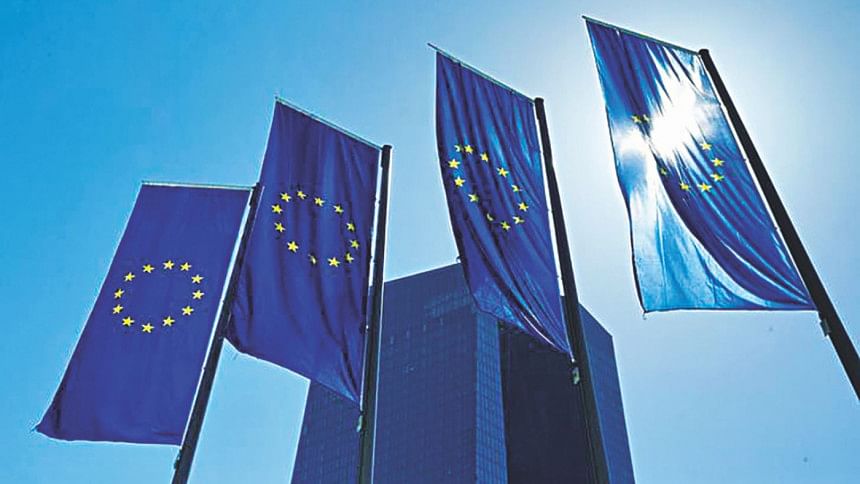Widening cracks in Europe

There is an ancient Chinese curse "May you live in interesting times"—interesting as opposed to blessed periods of peace and tranquillity. In this sense, Europe is certainly interesting these days. Its cracks are beginning to multiply and widen ominously.
The European Union (EU) seeks an "ever-growing unity" which some say may eventually culminate in a federal state. It has an executive Commission in Brussels, a Council representing all 28 member-states and an elected Parliament. More states are willing to join it. The biggest expansion, after the collapse of the Soviet Union, to include countries in Eastern Europe, was a great success. The economy of the largest of them, Poland, now the fifth-largest state in the EU, has grown 250 percent since it gained membership. The EU represents a powerful block of 500 million people in developed economies.
But look now at the growing cracks. Some are indeed not new. Not everybody wanted to aim beyond a single market and a community of national states in order to form a full federal state. The UK was for years excluded by de Gaulle. When it achieved membership, like several other countries, it did not join the common-currency eurozone (EZ), nor the Schengen Agreement on passport-free movement. Some Nordic countries as well as Switzerland have special trading arrangements. The earlier balanced leadership of France and Germany weakened after France failed to keep up with Germany's reunification and surging export success.
Many differences, however, are new and dangerous, particularly since the 2007-8 financial crisis. The UK's Brexit, due in March 2019, is a key example, and time is running out to reach agreements to minimise the social and economic damage it could cause to both sides. The post-crisis European Central Bank's whatever-it-takes approach steadied the markets and three bail-outs saved Greece, but a rift has developed between northern states which have benefitted from the EZ and southern states with weaker economies. Germany leads opposition to any cash transfers and insists on a strict diet of financial austerity and structural reform. Yet countries like Greece and Italy find such reforms politically difficult, preferring their old approach to restoring competitiveness by devaluing their currencies.
Now a new populist Italian government wants to end austerity and spend its way out of social strains. As it inherits massive government debt, this can only lead to a serious conflict with the European Commission. Given the size of the Italian economy, the very existence of the EZ could be threatened.
President Macron of France presses Chancellor Merkel of Germany to agree to plans for extensive EZ reforms, including banking union. Unfortunately, her own domestic political position has been weakened. She cannot go far against an ingrained German suspicion that EZ countries now in financial trouble would get cash from richer partners. An agreement reached in principle for a small EZ common budget was the most that she could accept, but even this is contested by the rich states.
To these Brexit and North/South cracks across Europe, one must add the soaring tension and East/West cracks arising out of the widespread opposition to migrant movement from the Middle East and North Africa. Merkel's much-applauded acceptance of over a million migrants in 2015 has produced a backlash. Political resistance to economic migrants and even to refugees is especially strong in eastern states formerly ruled by communists with little experience of foreigners of different cultural backgrounds. The "Visegrád Four" countries totally reject quotas to share the EU immigration burden.
The number of migrants now arriving is very much reduced, but has still brought a build-up of first arrivals in Italy, which other countries refuse to take. Italy now bars entry even to the survivors of Mediterranean-crossing disasters. At the same time, a new nationalist authoritarianism, especially in Poland and Hungary, clashes with EU's values on issues of judicial independence and press freedom. The EU Commission threatens to challenge them in the courts and to cut aid flows.
These multiplying North/South, East/West and Brexit strains came to a head when the European Council met in Brussels on June 28 but a lingering community spirit produced an outline plan to avoid breakdown.
These worrying internal cracks within the EU and EZ assume even greater significance against the current world background, especially with President Trump withdrawing the US from successive areas of international leadership and cooperation. The NATO summit next month, preceded by a Trump/Putin meeting, could be the next. "America First" becomes increasingly "America Isolationist". Globalism cannot be fully reversed, but liberal democracy backed by international institutions is already weakened.
Trump's obsession with trade deficits has also led him to embark on a series of disputes which could soon develop into very damaging trade wars, particularly with China, but also with the EU and NAFTA partners.
China's rise has been so sustained and so swift that the US increasingly views it as a power rival. Republicans pay less attention to the profits of US companies in China than to competition from state-directed capitalism and technology transfers. The US economy is still the larger one and its military supremacy remains, but the gaps are narrowing.
In a new world of harsher competition, the EU needs to uphold international structures and values enshrined in the UN Charter to be able to hold its own against the US and China. As the US is now an unreliable security umbrella, the EU needs to acquire more military capability and develop greater banking and financial cohesion to add to its already effective common trade policy.
This will not be easy. The European Council of 28 states (27 after Brexit) and European Parliament represent tenacious old national identities with differing outlooks. But the EU was born out of the frightful lessons of two world wars. The EZ itself may need reforms to survive but Europe, and indeed the world, must not slide towards catastrophe, whether of financial collapse or war. Liberal democracy and its values, with all their limitations, remain worth a sustained effort for their defence.
Selina Mohsin is a former ambassador.





Comments